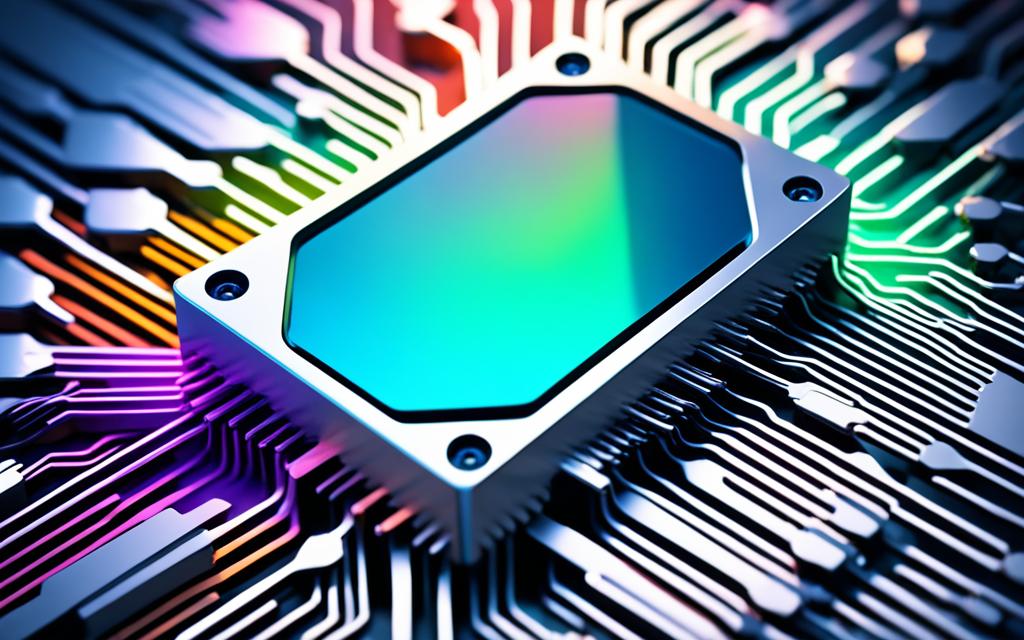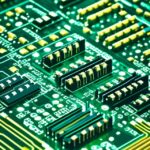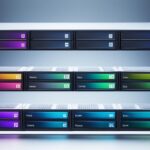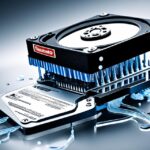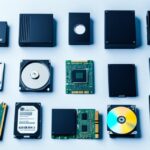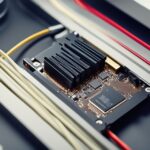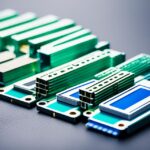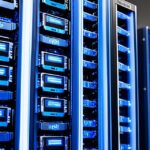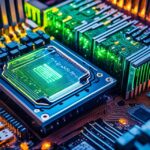Table of Contents
Ever wondered about the hard drive on your computer? It’s at the heart of many puzzling questions. Is it an input or output device? Actually, it’s both. A hard drive writes data when the computer asks (that’s input). It also lets users get to information when they need it (that counts as output). This dual role is key to knowing how it works.
With hard disks, your computer can store billions of bytes. Knowing how this storage works helps us get why data transfer is so important. This all adds up to a better understanding of computers. And it shows how crucial hard drives are in the world of technology1.
Key Takeaways
- A hard drive functions as both an input and output device in data management.
- It typically contains several billion bytes of storage capacity.
- Understanding hard disk roles is essential for grasping overall computer functionality.
- Data transfer processes are crucial to the efficiency of a hard drive.
- Its capability to store data for long-term purposes enhances computer reliability1.
Understanding Input and Output Devices
In the world of computers, knowing about devices that help with data is key. Input devices let users connect with technology, like typing or clicking. Keyboards, mice, microphones, and webcams make using computers better2. Also, 80% of students think power cords are important, just like microphones which all teachers use to teach these ideas3.
Defining Input Devices
Input devices send data but don’t get data back. They make talking to computers easy2. This easy use is why they’re important in computing, helping us share info smoothly.
Defining Output Devices
On the other hand, output devices show us data. Monitors, projectors, and speakers are examples, showing us what computers do2. They work by taking in data and then displaying it, making a useful system in computers.
The Role of I/O in Computing
I/O tasks are key for data management and communication. I/O devices handle both input and output, like CD-RW drives2. These drives, along with DVD-RW drives and USB flash drives, help users manage data efficiently4
What Are Hard Drives?
Hard drives are key in today’s computing world, acting as storage devices that keep data safe. It’s important to know the different types of hard drives to pick the right one for your needs.
Types of Hard Drives
The main types of hard drives are HDDs and SSDs. HDDs have spinning disks and have been used since 1956. They offer lots of storage space. SSDs, however, use flash memory and work faster and more reliably because they have no moving parts. Hitachi introduced the first 1 TB drives in 2007, and in 2015, HGST announced the first 10 TB drive5. Currently, the biggest drives, like the Ultrastar DC HC560, can hold up to 20 TB of data5.
How Hard Drives Function
Hard drives store and fetch data when needed. When a computer asks for information, the drive finds and sends it quickly. HDDs use heads that move over spinning disks to read and write data. SSDs get to data almost immediately because they don’t have mechanical parts. The IBM 350 could only hold 3.75 megabytes, showing how much drives have improved6. With new tech like shingled magnetic recording from Seagate in 2013, storage capacity has greatly increased5.
Is a Hard Drive an Input or Output Device?
A hard drive is crucial for managing computer data, acting as both an input and output device. Hard drive functions are key for storing and getting data, which impacts computer performance. It works as an input device when it receives and stores data.
When you need to get that data back, it switches to being an output device. This gives you the information you need.
Explanation of Hard Drive Functions
Hard drives are important because they handle both input and output. This shows how complex their data management is. They are vital for holding lots of information and for quick access to your files. This blend of input and output allows for easy system use.
Data Transfer Processes in Hard Drives
Data moves in hard drives using magnetic or solid-state tech. This makes communication with the computer fast. A special circuit manages the data flow, ensuring accuracy in and out. Constant tech improvements make these processes better, leading to superior data handling.
With newer storage technologies, today’s hard drives are faster and more efficient. This shows why it’s important to know how they work as input and output devices78..
How Hard Drives Act as Both Input and Output Devices
Hard drives are key in modern computers, linking data input and output. They are central for data reading and data writing. This knowledge helps boost hard drive performance and system efficiency.
Data Reading and Writing
Hard drives turn your commands into stored data through electrical signals. For data reading, these saved sequences are then fetched. This enables our devices to function smoothly. Hard Disk Drives (HDDs) can store a huge range, from 2 to 20 TB. This shows how much they can keep9.
More than 100 billion terabytes of data are stored worldwide. Hard disk drives and solid-state drives are the main storage methods used10.
Performance Metrics of Hard Drives
Hard drives are judged on Input/Output Operations Per Second (IOPS) and transfer rates. HDDs have read/write speeds of 100 to 250 MB/s. Solid-state drives are faster, with speeds from 1000 to 7500 MB/s10.
This shows why choosing the correct storage is crucial, especially for energy use. HDDs use 5 to 10 Watts, while SSDs use 2 to 12 Watts10. Understanding I/O operations is key for top system performance.
Comparing Hard Drives to Other I/O Devices
In today’s digital world, it’s important to understand the differences between hard drives and other I/O devices. These comparisons shine a light on their unique roles in storing and transferring data. Hard drives, as well as storage devices like USB flash drives, have two main jobs: they can read and write data.
Similarities with Other Storage Devices
Hard drives have a lot in common with other storage technologies. Both are key parts of data management systems, letting users store and get to information easily. For example, research shows that on FlashArray devices, most actions are to read data. Only a third is for writing it11. Similarly, a large majority of customer storage systems mainly deal with reading data, showing a common pattern across different storage types11.
Differences from Exclusive Input or Output Devices
Hard drives are different from devices that only input or only output data. Devices like keyboards are made just for entering data. Monitors, on the other hand, only show data. Hard drives can do both: they can take in data and show it, making them unique when compared to more specialised I/O gadgets. For example, modern hard disks move data at speeds between 40-60MB per second. This is slow compared to CPUs, which can handle over a billion tasks per second12.
The Importance of Hard Drives in Computer Systems
Hard drives play a crucial role in computers, affecting both how they work and our experience using them. They offer a lot of storage capacity. Nowadays, hard drives can hold from a few hundred gigabytes (GB) to one terabyte (TB). With one terabyte, you can store about 150,000 MP3 songs, showing the power of today’s storage tech13. This huge storage is essential for companies that need to keep a lot of data. It’s also great for people who have big collections of music and videos.
Storage Capacity and Efficiency
Hard drives do more than just store stuff. They make it easier and faster to get data when needed. Traditional hard disks, or HDDs, spin at speeds of 7,200 rotations per minute (rpm). This speed lets you quickly find and use data, helping your computer do many things at once smoothly13. Now, we also have solid-state drives (SSDs). They’re even faster than HDDs, which is great for programs that need to process data quickly.
Impact on System Performance
Hard drives are key to a computer’s speed and how well it works. Both HDDs and SSDs help improve a computer’s performance. SSDs, for instance, can move data super fast, up to 31.5 Gbit/s. This speed makes things load quicker and the computer more efficient14. Also, as these drives get cheaper and smaller, they become even more important in our digital world. The advancement in storage drives continuously changes how we store and access information online.
Conclusion
Hard drives stand out in the world of computing. They work both ways – by storing data and letting us retrieve it. This makes them very important for keeping our data safe and accessible. Their ability to both read and write data is key in how computers work today.
As gadgets get better, hard drives become even more important. They’re at the heart of storing and sharing data, from our personal files to big company systems. Hard drives help us manage all our information easily15. By understanding their role, we see how crucial they are in our digital lives.
FAQ
Is a hard drive considered an input or output device?
Hard drives work as both input and output devices. They act as input devices when you save data to them. As output devices, they work when you get data from them.
What are the main types of hard drives?
There are two key hard drive types. HDDs use spinning disks for reading and writing data. SSDs use flash memory, offering quicker access and better durability.
How do hard drives transfer data?
Hard drives move data by managing signal flows through their interfaces. This ensures the right handling of data, whether it’s being read or written.
What performance metrics should I consider for hard drives?
Look at the IOPS and transfer speeds of hard drives. These metrics show how efficient and suitable the drives are for different tasks.
How do hard drives compare with other storage devices?
Hard drives are unique as they can both read and write data. This sets them apart from devices like keyboards or monitors, which only input or output data.
Why are hard drives important for computer systems?
Hard drives are vital because they hold lots of data. This is key for saving information and helps your system work smoothly when fetching data.
Can SSDs completely replace HDDs?
SSDs are faster and more robust than HDDs, but HDDs are cheaper and hold more. This means each type is better suited for different storage needs.
Source Links
- https://www.indiastudychannel.com/experts/1307-hard-disk – Is hard disk an input/output device?
- https://www.computerhope.com/issues/ch001355.htm – What is the Difference Between an Input and Output Device?
- https://forum.code.org/t/is-the-power-cord-an-input/20438 – Is the power cord an input?
- https://www.computerhope.com/jargon/i/iodevice.htm – What is an Input/Output Device?
- https://www.techtarget.com/searchstorage/definition/hard-disk-drive – What is a Hard Disk Drive (HDD)? Definition from SearchStorage
- https://en.wikipedia.org/wiki/Hard_disk_drive – Hard disk drive
- https://www.javatpoint.com/input-device-vs-output-device – Difference between Input and Output Device – javatpoint
- https://en.wikibooks.org/wiki/A-level_Computing/AQA/Paper_2/External_hardware_devices/Input_and_output_devices – Hardware Devices: Input and output devices – Wikibooks, open books for an open world
- http://users.csc.calpoly.edu/~jdalbey/302/Lectures/ComputerBasics/computerintro.html – Introduction to Computers
- https://www.securedatarecovery.com/blog/types-of-hard-drives – Types Of Hard Drives – HDD & SSD (SATA, SAS, NVME)
- https://blog.purestorage.com/purely-technical/an-analysis-of-io-size-modalities-on-pure-storage-flasharrays/ – IOPS vs. Throughput: Why Both Matter
- https://courses.cs.washington.edu/courses/cse378/09wi/lectures/lec22.pdf – Introduction to I/O
- https://study.com/academy/lesson/what-is-a-hard-drive-types-function-definition.html – Hard Drive Definition, Types & Function – Lesson | Study.com
- https://newsandviews.dataton.com/what-is-ssd-and-hdd – What is HDD and SSD?
- https://software.land/what-is-io/ – What is IO?

